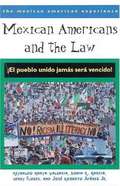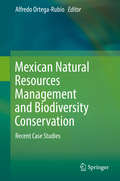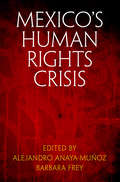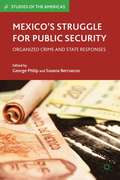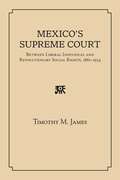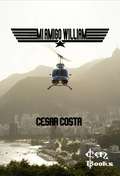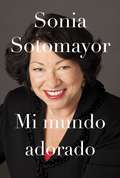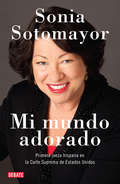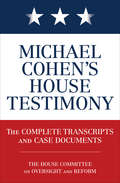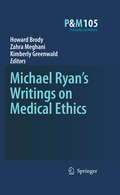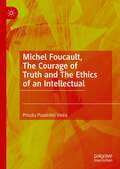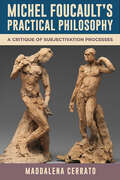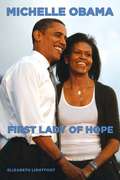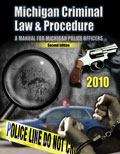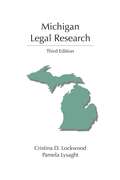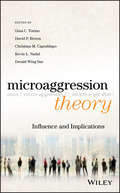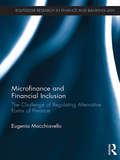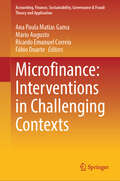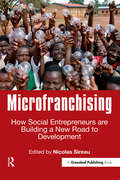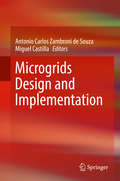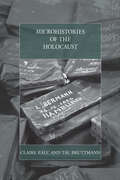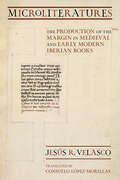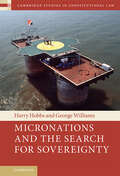- Table View
- List View
Mexican Americans & the Law: El Pueblo Unido Jamas Sera Vencido (The Mexican American experience)
by Reynaldo Anaya Valencia; Sonia R. Garcia; Henry Flores ; Jose Roberto JuarezThe experience of Mexican Americans in the United States has been marked by oppression at the hands of the legal system--but it has also benefited from successful appeals to the same system. Mexican Americans and the Law illustrates how Mexican Americans have played crucial roles in mounting legal challenges regarding issues that directly affect their political, educational, and socioeconomic status.
Mexican Natural Resources Management and Biodiversity Conservation: Recent Case Studies
by Alfredo Ortega-RubioThis book presents valuable and recent lessons learned regarding the links between natural resources management, from a Socio-Ecological perspective, and the biodiversity conservation in Mexico. It address the political and social aspects, as well as the biological and ecological factors, involved in natural resources management and their impacts on biodiversity conservation. It is a useful resource for researchers and professionals around the globe, but especially those in Latin American countries, which are grappling with the same Bio-Cultural heritage conservation issues.
Mexico's Human Rights Crisis (Pennsylvania Studies in Human Rights)
by Alejandro Anaya-Muñoz Barbara FreyLawless elements are ascendant in Mexico, as evidenced by the operations of criminal cartels engaged in human and drug trafficking, often with the active support or acquiescence of government actors. The sharp increase in the number of victims of homicide, disappearances and torture over the past decade is unparalleled in the country's recent history. <P><P>According to editors Alejandro Anaya-Muñoz and Barbara Frey, the "war on drugs" launched in 2006 by President Felipe Calderón and the corrupting influence criminal organizations have on public institutions have empowered both state and nonstate actors to operate with impunity. Impunity, they argue, is the root cause that has enabled a human-rights crisis to flourish, creating a climate of generalized violence that is carried out, condoned, or ignored by the state and precluding any hope for justice.Mexico's Human Rights Crisis offers a broad survey of the current human rights issues that plague Mexico. <P><P>Essays focus on the human rights consequences that flow directly from the ongoing "war on drugs" in the country, including violence aimed specifically at women, and the impunity that characterizes the government's activities. Contributors address the violation of the human rights of migrants, in both Mexico and the United States, and cover the domestic and transnational elements and processes that shape the current human rights crisis, from the state of Mexico's democracy to the influence of rulings by the Inter-American Court of Human Rights on the decisions of Mexico's National Supreme Court of Justice. <P><P>Given the scope, the contemporaneity, and the gravity of Mexico's human rights crisis, the recommendations made in the book by the editors and contributors to curb the violence could not be more urgent. <P><P>Contributors: Alejandro Anaya-Muñoz, Karina Ansolabehere, Ariadna Estévez, Barbara Frey, Janice Gallagher, Rodrigo Gutiérrez Rivas, Susan Gzesh, Sandra Hincapié, Catalina Pérez Correa, Laura Rubio Díaz-Leal, Natalia Saltalamacchia, Carlos Silva Forné, Regina Tamés, Javier Treviño-Rangel, Daniel Vázquez, Benjamin James Waddell.
Mexico's Struggle for Public Security
by George Philip Susana BerruecosThe Mexican government's full-frontal attack on the powerful drugs cartels has achieved mixed results. This book considers the issue from a variety of viewpoints. The essential argument is that the organized crime is best combated by institutional reforms directed at strengthening the rule of law rather than by a heavy reliance on armed force.
Mexico's Supreme Court: Between Liberal Individual and Revolutionary Social Rights, 1867-1934
by Timothy M. JamesAlthough Mexico&’s Constitution of 1917 mandated the division of large landholdings, provided land for the landless, and guaranteed workers the rights to organize, strike, and bargain collectively, it also guaranteed fundamental liberal rights to property and due process that enabled property owners and employers to resist the implementation of the new social rights by filing suit in federal court. Taking as its main focus the way new and old rights were adjudicated before the Supreme Court, this book is the first to examine the subject through the lens of court documents and the writings and commentaries of jurists and other legal professionals. The author asks and answers the question, how did the judicial interpretation of the Constitution of 1917 become a barrier to implementing agrarian land rights and labor legislation in the years immediately following Mexico&’s social revolution of 1910?
Mi Amigo William
by César CostaEste es un simple homenaje a un querido amigo que se fue. Un guerrero que amaba lo que estaba haciendo y se apartó de esta vida en el ejercicio de su función. En este trabajo podrás conocer un poco del chico que conocí, un chico feliz, amigo e incluso un bromista. Según mi visión, podrá conocer algunas de nuestras historias, así como los momentos finales de su vida. Que cada uno lea este trabajo y cambie sus conceptos de relaciones humanas, que no permitamos que la tecnología nos prive del contacto personal, y que ninguno de nosotros pueda estar seguro de la presencia de aquellos a quienes amamos y apreciamos cada minuto de esta vida. Esta edición está revisada y extendida, contiene algunas historias nuevas y detalles de otros casos ya reportados.
Mi mundo adorado
by Sonia SotomayorLa primera latina y tan sólo la tercera mujer designada a la Corte Suprema de los Estados Unidos, Sonia Sotomayor se ha convertido en un icono americano contemporáneo. Ahora, con un candor e intimidad nunca antes asumidos por un juez en activo, Sonia nos narra el viaje de su vida --desde los proyectos del Bronx hasta la corte federal-- en una inspiradora celebración de su extraordinaria determinación y del poder de creer en uno mismo. Esta es la historia de una niñez precaria, con un padre alcohólico que moriría cuando ella tenía nueve años y una madre devota pero sobrecargada, y del refugio que una niña tomó de la confusión del hogar con su apasionada y enérgica abuela. Pero no fue hasta que le diagnosticaron diabetes juvenil que la precoz Sonia reconoció que, en última instancia, dependía de sí misma. Pronto aprendería a darse a sí misma las inyecciones de insulina necesarias para sobrevivir y a rápidamente forjar un camino hacia una vida mejor. Con personajes de televisión como modelo y poca idea sobre lo que en realidad implicaba, Sonia decidió ser abogada, un sueño que la sostendría en su improbable recorrido, desde su brillante paso por la escuela secundaria, la universidad de Princeton y la escuela de Derecho de Yale hasta la fiscalía de distrito del Condado de Nueva York, la práctica privada, y el nombramiento a la Corte Federal de Distrito, todo antes de llegar a los cuarenta años. A lo largo del camino vemos como Sonia fue formada por diversas experiencias (como su fallido matrimonio), mentores invaluables, y la versión moderna de familia que creó con amigos queridos y sus hijos. A través de sus aún asombrados ojos, las posibilidades infinitas de los Estados Unidos son vislumbradas nuevamente en este libro cálido y honesto, destinado a convertirse en un clásico de la autoformación y el autodescubrimiento.
Mi mundo adorado
by Sonia SotomayorLa primera latina y la tercera mujer designada a la Corte Suprema de Estados Unidos, Sonia Sotomayor se ha convertido en un ícono contemporáneo. Ahora, con un candor e intimidad inusitados, Sonia nos narra el viaje de su vida -desde los proyectos del Bronx hasta la corte federal- en una inspiradora celebración del poder de creer en uno mismo.Ésta es la historia de una niñez precaria, con un padre alcohólico que moriría cuando ella tenía nueve años y una madre devota pero sobrecargada, y del refugio que una niña tomó de la confusión del hogar con su enérgica abuela. Pero no fue hasta que le diagnosticaron diabetes juvenil cuando la precoz Sonia reconoció que, en última instancia, dependía de sí misma. Pronto aprendería a ponerse a sí misma las inyecciones de insulina necesarias para sobrevivir y forjar un camino hacia una vida mejor.Con personajes de televisión como modelo y con poca idea sobre lo que en realidad implicaba, Sonia decidió ser abogada, unsueño que la sostendría en su improbable recorrido, desde su brillante paso por la escuela secundaria, la Universidad de Princeton y la Escuela de Derecho de Yale hasta la Fiscalía de Distrito del Condado de Nueva York, la práctica privada, y el nombramiento a la Corte Federal de Distrito, todo antes de llegar a los cuarenta años.A lo largo del camino vemos cómo Sonia fue formada por diversas experiencias, mentores invaluables, y la versión moderna de familia que creó con sus amigos y sus hijos. Todos esos elementos se hilvanan en un libro cálido y honesto, destinado a convertirse en un clásico de la autoformación y el autodescubrimiento.
Mi mundo adorado (Vintage Espanol Ser.)
by Sonia SotomayorLa primera latina y tan sólo la tercera mujer designada a la Corte Suprema de los Estados Unidos, Sonia Sotomayor se ha convertido en un icono americano contemporáneo. Ahora, con un candor e intimidad nunca antes asumidos por un juez en activo, Sonia nos narra el viaje de su vida desde los proyectos del Bronx hasta la corte federal en una inspiradora celebración de su extraordinaria determinación y del poder de creer en uno mismo. Esta es la historia de una niñez precaria, con un padre alcohólico que moriría cuando ella tenía nueve años y una madre devota pero sobrecargada, y del refugio que una niña tomó de la confusión del hogar con su apasionada y enérgica abuela. Pero no fue hasta que le diagnosticaron diabetes juvenil que la precoz Sonia reconoció que, en última instancia, dependía de sí misma. Pronto aprendería a darse a sí misma las inyecciones de insulina necesarias para sobrevivir y a rápidamente forjar un camino hacia una vida mejor. Con personajes de televisión como modelo y poca idea sobre lo que en realidad implicaba, Sonia decidió ser abogada, un sueño que la sostendría en su improbable recorrido, desde su brillante paso por la escuela secundaria, la universidad de Princeton y la escuela de Derecho de Yale hasta la fiscalía de distrito del Condado de Nueva York, la práctica privada, y el nombramiento a la Corte Federal de Distrito, todo antes de llegar a los cuarenta años. A lo largo del camino vemos como Sonia fue formada por diversas experiencias (como su fallido matrimonio), mentores invaluables, y la versión moderna de familia que creó con amigos queridos y sus hijos. A través de sus aún asombrados ojos, las posibilidades infinitas de los Estados Unidos son vislumbradas nuevamente en este libro cálido y honesto, destinado a convertirse en un clásico de la autoformación y el autodescubrimiento.
Michael Cohen's House Testimony: The Complete Transcripts and Case Documents
by Diversion BooksThe full transcript of one of the most shocking testimonies of the Trump Era and in the history of the United States government. &“I am ashamed that I chose to take part in concealing Mr. Trump&’s illicit acts…. I am ashamed because I know what Mr. Trump is. He is a racist. He is a conman. He is a cheat.&” —from Michael Cohen&’s Opening Statement to the House Oversight Committee &“Michael Cohen…was just disbarred by the State Supreme Court for lying & fraud. He did bad things unrelated to Trump. He is lying in order to reduce his prison time.&” —President Donald J. Trump On February 27, 2019, with the world watching, Michael Cohen—former lawyer and fixer for President Donald J. Trump—took the stand in front of the House Oversight Committee and delivered one of the most sensational days of Congressional testimony in history. Not since President Richard Nixon&’s White House counsel John Dean turned on him during the Watergate scandal has a close presidential associate attacked the character of the chief of state and charged him with criminal acts. Here in one volume is living history—the hard-hitting prepared statements, the damning evidence, the salacious charges, the belligerent questioning, and the stunning revelations.
Michael Ryan’s Writings on Medical Ethics
by Howard A. Brody Zahra Meghani Kimberly GreenwaldMichael Ryan (d. 1840) remains one of the most mysterious figures in the history of medical ethics, despite the fact that he was the only British physician during the middle years of the 19th century to write about ethics in a systematic way. Michael Ryan's Writings on Medical Ethics offers both an annotated reprint of his key ethical writings, and an extensive introductory essay that fills in many previously unknown details of Ryan's life, analyzes the significance of his ethical works, and places him within the historical trajectory of the field of medical ethics.
Michel Foucault, The Courage of Truth and The Ethics of an Intellectual
by Priscila Piazentini VieiraThe relationship between two distinct periods in Michel Foucault's work is the starting point for this book. In "Truth and Power," an interview Foucault gave in 1976, he states that to create a new politics of truth is an intellectual's main task. In this book, Priscila Piazentini Vieira analyzes Foucault's study on ancient culture and courage of truth in the 1980s as his main contribution to our construction of a new politics of truth, much diverse from modernity's prevailing understanding of it grounded on the will to knowledge. Furthermore, she analyzes Foucault's militant practice and his GIP experience from a corpus constructed by papers, courses, interviews, and books written by the philosopher between the 1970s and 1980s. By clearly linking Foucault’s work on to his own militant activity, the book also aims to develop an original definition of the intellectual at the crossroad of political engagement, the production of knowledge, and the manifestation of the truth.
Michel Foucault’s Practical Philosophy: A Critique of Subjectivation Processes (SUNY series in Contemporary French Thought)
by Maddalena CerratoOffers a holistic approach to Michel Foucault's thought, introducing the idea of practical philosophy as an original interpretative framework.Michel Foucault's thought, Maddalena Cerrato writes, may be understood as practical philosophy. In this perspective, political analysis, philosophy of history, epistemology, and ethics appear as necessarily cast together in a philosophical project that aims to rethink freedom and emancipation from domination of all kinds. The idea of practical philosophy accounts for Foucault's specific approach to the object, as well as to the task of philosophy, and it identifies the perspective that led him to consider the question of subjectivity as the guiding thread of his work. Overall, Cerrato shows the deep consistency underlying Foucault's reflection and the substantial coherence of his philosophical itinerary, setting aside all the conventional interpretations that pivot on the idea that his thought underwent a radical "turn" from the political engagement of the question of power toward an ethical retrieval of the question of subjectivity.
Michelle Obama: First Lady of Hope
by Elizabeth LightfootFrom Lady Bird Johnson's highway beautification initiative to Jacqueline Kennedy's White House renovation to Barbara Bush's literacy project - and let's not forget Nancy Reagan's "Just Say No" program - first ladies have captivated and enthralled the voting public for 200 years. Michelle Obama has played an influential role in her husband's campaign, and is certain to do the same during his presidency. Michelle Obama: First Lady of Hope examines, for the first time, her astonishing career - from her undergraduate years at Princeton, where she majored in African Studies, to her studies at Harvard Law School, where she obtained a Juris Doctor degree. This fascinating book will further address her influence on her husband, her role in his presidential campaign, and her political beliefs. Michelle Obama is sure to be one of the most intriguing and influential First Ladies in history. She first met Barack Obama when she was asked to serve as his mentor at a prestigious Chicago law firm. She and Barack were the only African-Americans. The couple married in 1992. She is her husband's closest advisor. A Chicago native, she has attracted much media attention for her candor and frankness. This trait will serve her well in the White House, where no move or statement goes unnoticed.
Michigan Criminal Law and Procedure: A Manual for Michigan Police Officers (2nd Edition)
by Michigan Department of State PoliceSeveral legal instructors throughout the state of Michigan contributed to the development of this and previous editions of this book in hopes that it will help police officers and police recruits comprehend the legal parameters that they operate within on a day-to-day basis.
Michigan Legal Research
by Pamela Lysaght Cristina LockwoodMichigan Legal Research, Third Edition, is a concise, yet thorough, guide to conducting legal research in Michigan. Importantly, it also includes references to federal legal resources. In addition to updating all sources discussed, this edition, more so than previous editions, focuses on free legal resources, including current commercial and government sources. For the free online sources, this edition includes directions on how to navigate the website to make it easy for the reader to find the relevant information. Where applicable, references to new and established subscription-based resources are juxtaposed against those resources that are available for free. The goal is to help the reader make an informed decision regarding when to use a fee-based service as opposed to a free legal resource. This edition continues to draw upon the authors' years of experience teaching legal writing and research by providing the tools for conducting efficient and effective legal research, as well as discussing the interplay between legal research and legal analysis.
Microaggression Theory: Influence and Implications
by Derald Wing Sue Kevin L. Nadal Gina C. Torino David P. Rivera Christina M. CapodilupoGet to know the sociopolitical context behind microaggressions Microaggressions are brief, everyday exchanges that send denigrating messages to certain individuals because of their group membership (e.g., race, gender, culture, religion, social class, sexual orientation, etc.). These daily, common manifestations of aggression leave many people feeling vulnerable, targeted, angry, and afraid. How has this become such a pervasive part of our social and political rhetoric, and what is the psychology behind it? In Microaggression Theory, the original research team that created the microaggressions taxonomy, Gina Torino, David Rivera, Christina Capodilupo, Kevin Nadal, and Derald Wing Sue, address these issues head-on in a fascinating work that explores the newest findings of microaggressions in their sociopolitical context. It delves into how the often invisible nature of this phenomenon prevents perpetrators from realizing and confronting their own complicity in creating psychological dilemmas for marginalized groups, and discusses how prejudice, privilege, safe spaces, and cultural appropriation have become themes in our contentious social and political discourse. Details the psychological effects of microaggressions in separate chapters covering clinical impact, trauma, related stress syndromes, and the effect on perpetrators Examines how microaggressions affect education, employment, health care, and the media Explores how social policies and practices can minimize the occurrence and impact of microaggressions in a range of environments Investigates how microaggressions relate to larger social movements If you come across the topic of microaggressions in your day-to-day life, you can keep the conversation going in a productive manner—with research to back it up!
Microfinance and Financial Inclusion: The challenge of regulating alternative forms of finance (Routledge Research in Finance and Banking Law)
by Eugenia MacchiavelloFollowing the recent global financial crisis there is a growing interest in alternative finance – and microfinance in particular – as new instruments for providing financial services in a socially responsible way or as an alternative to traditional banking. Nonetheless, correspondingly there is also a lack of clarity about how to regulate alternative financial methods particularly in light of the financial crisis’ lessons on regulatory failure and shadow banking’s risks. This book considers microfinance from a legal and regulatory perspective. Microfinance is the provision of a wide range of financial services, particularly credit but also remittances, savings, to low-income people or financially excluded people. It combines a business structure with social inspiration, often resorts to technological innovations to lower costs (Fintech: e.g. crowdfunding and mobile banking) and merges with traditional local experiences (e.g. financial cooperatives and Islamic finance), this further complicating the regulatory picture. The book describes some of the unique dimensions of microfinance and the difficulties that this can cause for regulators, through a comparative analysis of selected European Union (EU) countries’ regimes. The focus is in fact on the EU legal framework, with some references to certain developing world experiences where relevant. The book assesses the impact and validity of current financial regulation principles and rules, in light of the most recent developments and trends in financial regulation in the wake of the financial crisis and compares microfinance with traditional banking. The book puts forward policy recommendations for regulators and policy makers to help address the challenges and opportunities offered by microfinance.
Microfinance, Rights and Global Justice
by Tom Sorell Luis Cabrera Sorell, Tom and Cabrera, LuisMicrofinance - the practice of providing small loans to promote entrepreneurial activity among those with few financial assets - is increasingly seen as a sustainable means of aiding the global poor. Perhaps its most influential advocate, Nobel Laureate Muhammad Yunus, has claimed that there is a human right to microfinance, given its potential for poverty alleviation. This book directs critical philosophical attention at this very widely used and praised poverty-reducing measure. In chapters that discuss microfinance schemes and models around the world, internationally renowned contributors address important questions about both the positive impact of microfinance and cases of exploitation and repayment pressure. Exploring how far microfinance can or should be situated within broader concerns about justice, this volume sheds light on ethical issues that have so far received little systematic attention, and it advances discussion on new human rights, exploitation, and global justice.
Microfinance: Interventions in Challenging Contexts (Accounting, Finance, Sustainability, Governance & Fraud: Theory and Application)
by Ana Paula Matias Gama Fábio Duarte Mário Augusto Ricardo Emanuel CorreiaThis book aims to bring new insights into the effectiveness of microfinance as a tool for boosting entrepreneurial activities that in turn enhance the capabilities of individuals living in extreme poverty across several dimensions of human development, especially in the current challenging times for both individuals and the microfinance industry. Theoretical contributions explore the interplay between classical microfinance models and entrepreneurial ecosystems as well as innovative microfinance models, such as the pass-through microlending model in the crowdfunding context. Empirical contributions shed light to the interplay between microfinance and poverty, economic development, well-being and women’s empowerment. The book also considers responses to emerging challenges, such as the COVID-19 pandemic, and promoting Sustainable Development Goals (SDG) in the microfinance market, specifically focusing on eliminating extreme poverty (SDG1), promoting shared economic growth (SDG8), and reducing the inequalities among countries (SDG10) to ensure all people achieve prosperity.
Microfranchising: How Social Entrepreneurs are Building a New Road to Development
by Nicolas SireauIt is increasingly clear that fifty years of international development have done little to reduce poverty in Africa. Indeed, more and more academics and practitioners are highlighting the detrimental effect of traditional development – as carried out by international agencies and NGOs – which often leads to dependency, inefficiency, waste and poor governance. Yet there is a new movement that is surging ahead in its attempt to reduce poverty and generate wealth in Africa: microfranchising. Set up by pioneering organizations such as VisionSpring and HealthStore, microfranchising is based on one of the most successful market-based models in Western economies: franchising. From McDonald's to Coca-Cola, franchising has proven itself to be an effective and replicable way of scaling up a business rapidly in the Western context. It is only recently that members of the growing body of social entrepreneurs have turned to the franchise model as one of the responses to Africa's endemic economic stagnation. And the results have been inspiring: instead of the dependency generated by traditional charity development projects, these new social capitalists have generated enterprise and self-sustainability in the most challenging environments of rural Africa. This long-needed book looks at the growth in microfranchising as a tool to generate wealth among poor communities in Africa. The book traces the evolution of the concept of microfranchising, from its foundation in Western models to its implementation in African countries today. It provides practical steps from the world's leading experts on how to set up a microfranchise, from recruiting franchisees, to building a brand and a supply chain. It gives case studies of successful microfranchises, told by the enterprises themselves. It continues with a theoretical analysis of the place of microfranchising within global social entrepreneurship. It ends with a look at the future for microfranchising, with recommendations for development. Edited by the former CEO of SolarAid, which created the Sunny Money microfranchise, the book provides a ground-breaking set of case studies and analysis of microfranchising for development. It brings together academics and practitioners to provide context, analysis and practical advice. Indeed, it provides the theory, the practical advice and the case studies to guide any entrepreneur, NGO, business or government interested in setting up their own microfranchise scheme.
Microgrids Design and Implementation
by Antonio Carlos Zambroni de Souza Miguel CastillaThis book addresses the emerging trend of smart grids in power systems. It discusses the advent of smart grids and selected technical implications; further, by combining the perspectives of researchers from Europe and South America, the book captures the status quo of and approaches to smart grids in a wide range of countries. It describes the basic concepts, enabling readers to understand the theoretical aspects behind smart grid formation, while also examining current challenges and philosophical discussions. Like the industrial revolution and the birth of the Internet, smart grids are certain to change the way people use electricity. In this regard, a new term – the “prosumer” – is used to describe consumers who may sometimes also be energy producers. This is particularly appealing if we bear in mind that most of the distributed power generation in smart grids does not involve carbon emissions. At first glance, the option of generating their own power could move consumers to leave their current energy provider. Yet the authors argue that doing so is not a wise choice: utilities will play a central role in this new scenario and should not be ignored.
Microhistories of the Holocaust (War and Genocide #24)
by Claire Zalc Tal BruttmannHow does scale affect our understanding of the Holocaust? In the vastness of its implementation and the sheer amount of death and suffering it produced, the genocide of Europe’s Jews presents special challenges for historians, who have responded with work ranging in scope from the world-historical to the intimate. In particular, recent scholarship has demonstrated a willingness to study the Holocaust at scales as focused as a single neighborhood, family, or perpetrator. This volume brings together an international cast of scholars to reflect on the ongoing microhistorical turn in Holocaust studies, assessing its historiographical pitfalls as well as the distinctive opportunities it affords researchers.
Microliteratures: The Production of the Margin in Medieval and Early Modern Iberian Books (Medieval Societies, Religions, and Cultures)
by Jesús R. VelascoMicroliteratures is an innovative examination of writings done in the margins of medieval manuscripts and early modern books. Not always as formal as glosses, sometimes feverish and abbreviated, these marginal writings or, "microliteratures," are the product of readers thinking with the text at the center of the page. Jesús R. Velasco argues that microliteratures are not private annotations but, rather, a humanistic activity performed in the public sphere. These marginal engagements with texts are made public to future readers of the same book. Surveying the microliteratures of a wide range of medieval and early modern Iberian genres—legal, religious, chivalric, and political texts—Velasco finds that in the shared space and time of reading, microliterary actions and artifacts are also models of public humanities work that connects texts to contemporary issues. Microliteratures emerge from this ambitious book as a way of understanding the self as a reflective and politically engaged reader in conversation with past, present, and future readers as contemporaries.
Micronations and the Search for Sovereignty
by George Williams Harry HobbsPolitical disagreement is a fact of life. Such conflict can prompt people to stand for public office and seek to realise political change. Others take a different route; they start their own country. Micronations and the Search for Sovereignty is the first comprehensive examination of the phenomenon of people purporting to secede and create their own country. It analyses why micronations are not states for the purposes of international law, considers the factors that motivate individuals to separate and found their own nation, examines the legal justifications that they offer and explores the responses of recognised sovereign states. In doing so, this book develops a rich body of material through which to reflect on conventional understandings of statehood, sovereignty and legitimate authority. Authored in a lively and accessible style, Micronations and the Search for Sovereignty will be valuable reading for scholars and general audiences.
